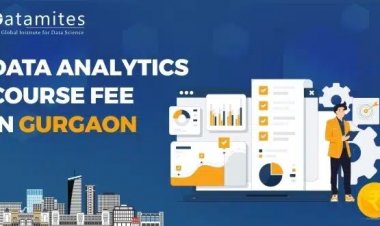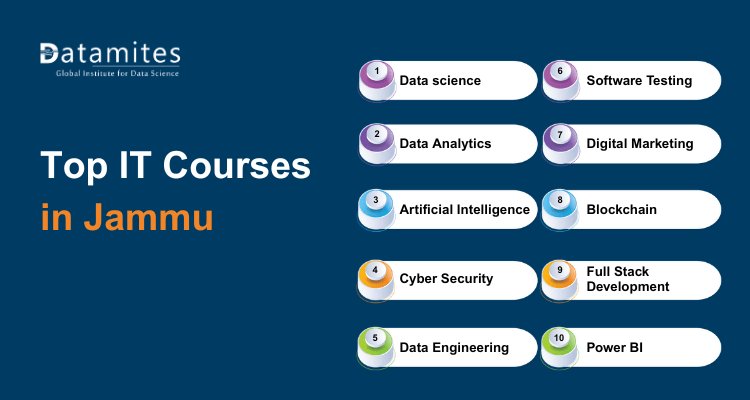Applying Data Analytics to Finance
Explore how data analytics is transforming finance, banking, and insurance sectors through real-world case studies, key applications, salary trends, and career insights. Discover top data analyst training opportunities across major Indian cities.

In the current era of modernization, big data is altering commercial and technical settings. Every day, a considerable deal of financial events occur, and the financial sector is heavily involved in the calculation of these occurrences. Owing to this, there are an incalculable number of financial transactions and daily data generation in the financial sector.
Data analytics in finance is crucial, with only 0.5% of financial organizations effectively using their data. With digital transformation surging, analytics skills like financial modeling and risk analysis are crucial for driving customer insights, efficiency, and revenue in fintech.
Why is Data Analytics used in the Financial Industry?
In today’s digital economy, data has become a critical asset for every business. When utilized effectively, data analytics in finance allows organizations to extract valuable insights, forecast trends, and make informed decisions. It helps identify risks, improve efficiency, and support long-term strategic planning, making it a vital tool for financial success.
The synergy between finance and analytics is revolutionizing decision-making. By leveraging advanced analytics, financial institutions can uncover patterns in massive data sets, optimize investment strategies, ensure regulatory compliance, and identify market opportunities, enhancing efficiency and profitability. Traditional methods fall short, making data analytics essential in modern financial operations.
Personalization is a key advantage of data analytics in finance, allowing institutions to customize services based on customer behavior, preferences, and transaction patterns. This approach enhances customer experience and fosters loyalty. Today, businesses also use analytics to identify target markets, launch new offerings, and drive deeper engagement.
According to the U.S. Labor Department, the demand for financial analysts is projected to increase by 8% by 2032, with approximately 27,400 job openings annually. This makes it an ideal time to explore a data analyst career in this fast-evolving domain.
The finance industry is rapidly evolving due to global events, digital transformation, and the convergence of industries. In this dynamic environment, data analytics in finance plays a crucial role in helping institutions interpret massive volumes of customer and transaction data to drive smarter decisions. From detecting fraud and reducing risks to identifying market trends and enhancing customer experiences, finance and analytics go hand in hand.
The increasing demand for financial analysts reflects the industry's need for professionals who can turn raw data into actionable insights, enabling banks and insurance companies to innovate, stay competitive, and ensure regulatory compliance effectively.
Refer to the articles below:
- How is Data Analytics Influencing the Educational Sector
- Data Analytics in Business – How does it benefit Business Operations
- Data Analytics in the Healthcare Sector
Key Applications of Data Analytics in the Finance Industry
Data analytics is revolutionizing the finance sector including banking and insurance, by driving smarter decisions, reducing risks, and unlocking valuable customer insights. Here are the key applications of data analytics in finance that are reshaping financial operations today:
1. Financial Health Check using Data Analytics
Analytics evaluates cash flow, asset utilization, and performance KPIs to detect early inefficiencies. This helps financial institutions maintain profitability and operational resilience.
2. Fraud Detection & Risk Management using Data Analytics
Data analytics identifies suspicious behavior and high-risk accounts for early fraud prevention. It ensures better compliance and lowers potential financial losses.
3. Sales Trend Analytics for Financial Growth
Analyzes sales trends and profit margins to understand customer demand and market shifts. This enables targeted improvements in financial products and strategies.
4. Digital Banking Optimization with Analytics
Analytics compares digital and branch banking performance across multiple touchpoints. It enhances service delivery by identifying user preferences and pain points. Optimizes currency flow, operational efficiency, and customer satisfaction in real-time.
5. AI Chatbots & Virtual Assistants
Financial institutions use analytics to power AI-driven chatbots for customer support. These bots handle routine queries, reducing the workload on human agents. Analytics helps track interactions, improving accuracy and real-time response quality.
6. Customized Finance Marketing with Data Analytics
Analytics uses customer behavior, transaction history, and demographics to tailor campaigns. It enables hyper-personalized targeting of high-value customer segments. As a result, engagement, conversion rates, and customer loyalty increase.
7. Analytics for Financial Recommendations
Analytics powers predictive models that suggest personalized financial products. Recommendations are based on factors like credit score, income, and spending patterns. This boosts cross-selling, customer satisfaction, and retention.
8. Strategic Budget Planning with Data Analytics
Analytics supports accurate expense tracking, forecasting, and market benchmarking. It enables financial institutions to set realistic goals and allocate resources efficiently. Improves strategic planning and long-term financial health.
9. Improved Decision-Making using Data Analytics
Analytics delivers real-time, data-backed insights to finance leaders. It helps forecast trends, assess risks, and seize new opportunities quickly. This leads to faster and more informed financial decisions.
10. Customer Profitability Insights with Analytics
Identifies clients generating higher returns while flagging risk-prone ones. Optimizes customer portfolio management. By leveraging data analytics, finance companies enhance efficiency, minimize risk, and sharpen strategic focus. Let’s explore how data analytics is transforming the finance industry, with a focus on the data analytics with banking and insurance sectors.
Let’s explore how data analytics is transforming various financial domains with precision and agility. From banking and insurance to investment and risk management, analytics is driving smarter, faster, and more strategic decisions.
Refer to the articles below:
- Data Analytics for the E-commerce Sector
- Data Analytics in Retail Industries
- Data Analytics in Logistics
Data Analytics in Banking Sector
Data analytics in banking is revolutionizing operations by enhancing risk assessment, fraud detection, and credit evaluation through advanced modeling techniques. It enables banks to monitor performance via KPI dashboards, optimize sales strategies, and drive data-informed growth. Customer analytics allows for service personalization, boosting retention and acquisition with tools like chatbots and predictive engines.
Additionally, data analytics supports decisions on ATM placements, staffing, and compliance reporting, making it a vital tool for boosting efficiency and competitiveness in today’s digital banking environment.
Data Analytics in Insurance
Data analytics in insurance is revolutionizing how companies assess risk, price products, and engage customers. In a highly competitive market, insurers use predictive analytics to customize offerings, optimize premiums, and improve customer retention. Risk profiling enables accurate underwriting decisions, while fraud detection systems ensure swift claims processing.
Financial analysts leverage data to design innovative strategies and identify new market opportunities. As digital transformation accelerates, data analytics empowers insurance firms to enhance services, reduce risks, and stay ahead in the evolving financial landscape.
Refer to the articles below:
- What would be the Data Analyst Course Fee in India
- How to Become a Data Analyst in India
- Data Analyst Career Scope in India
Let’s also explore the average Financial Data Analyst salaries across major countries, according to Glassdoor:
- The financial data analyst salary in India ranges from ₹5L - ₹7LPA.
- The financial data analyst salary in the United States is $62T - $1L/yr.
- The financial data analyst salary in the United Kingdom ranges from £29T - £39T/yr.
- The financial data analyst salary in UAE ranges from AED 12T - AED 12T/mo.
- The financial data analyst salary in Singapore ranges from SGD 4T - SGD 4T/mo.
- The financial data analyst salary in Germany ranges from €45T- €61T/yr.
- The financial data analyst salary in South Africa is between ZAR 16T - ZAR 21T/mo.
These figures highlight the strong global demand and rewarding data analyst career prospects for financial analysts across diverse economic landscapes. Let’s now explore some real-world case studies showcasing data analytics in action.
Real-World Cases Using Data Analytics in Finance
Here are two compelling case studies showcasing how leading data analytics in Finance, data analytics in banking and insurance sector to drive innovation, enhance decision-making, and deliver value to customers:
- Kabbage, a fintech firm by American Express, uses data analytics and machine learning to assess creditworthiness of small businesses by analyzing banking transactions, online sales, and social media data.
The Research Gate study shows that, Kabbage automatically processed over 300,000 small business loans for 145,000+ customers, distributing more than USD 5 billion in funding, an achievement powered by analytics and real-time data access
- Westpac DataX platform uses anonymized credit card data and dashboards to analyze trends, benchmark performance, and deliver personalized products to targeted customer segments.
The Case Study published by TCS on Westpac’s DataX analytics platform processes over 6 million daily credit‑card transactions, enabling clients to benchmark performance and make actionable decisions based on market trends.
Data analytics is transforming the financial sector by enabling smarter decisions, reducing risks, and driving innovation. As demand for financial analysts rises, mastering analytics is key to staying competitive in the evolving global economy.
Refer to the articles below:
- Data Science vs. Big Data vs. Data Analytics
- Data Science Vs Data Analytics
- Data Analyst vs. Data Scientist
Enrolling in a Data Analyst training in Hyderabad program across major cities like Pune, Chennai, Bangalore, Mumbai, Coimbatore, Ahmedabad, and Delhi. India’s leading tech hubs provide aspiring professionals with practical exposure, industry collaboration, and a strong foundation for an emerging data analyst career.
DataMites Institute stands out as a leading training institute in India, offering expert-led courses in Data Analytics course, Data Science, Machine Learning, Artificial Intelligence, Python, IoT, and Data Engineering. Its industry relevant curriculum includes hands-on projects, certified internships, placement support, and globally recognized certifications accredited by IABAC and NASSCOM FutureSkills.
With flexible learning options for both online and offline learning. DataMites equips learners with the future-proof skills needed in today’s dynamic job market. Its widespread presence across India includes Data Analyst courses in Pune, as well as in Hyderabad, Ahmedabad, Chennai, Kochi, Coimbatore, Mumbai, Delhi, Jaipur, Bangalore, and Kolkata.
What is HR analytics?
What is Box Plot







